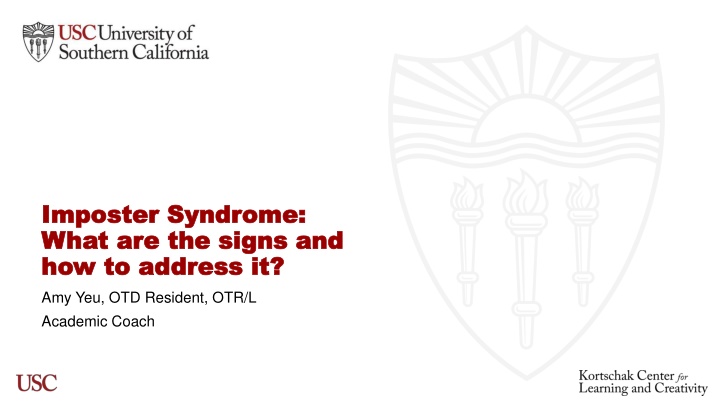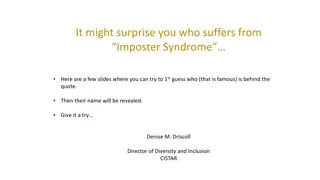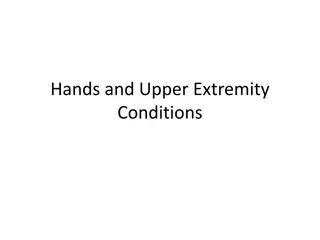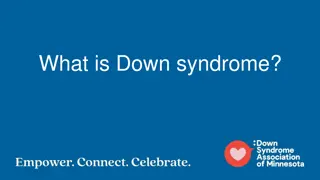
Overcoming Imposter Syndrome: Signs, Experiences, and Solutions
Learn about the signs, experiences, and ways to address Imposter Syndrome, such as feelings of inauthenticity, fear of failure, and self-doubt. Discover strategies like recognizing strengths, seeking support, and changing unhelpful behaviors to overcome Imposter Syndrome.
Download Presentation

Please find below an Image/Link to download the presentation.
The content on the website is provided AS IS for your information and personal use only. It may not be sold, licensed, or shared on other websites without obtaining consent from the author. If you encounter any issues during the download, it is possible that the publisher has removed the file from their server.
You are allowed to download the files provided on this website for personal or commercial use, subject to the condition that they are used lawfully. All files are the property of their respective owners.
The content on the website is provided AS IS for your information and personal use only. It may not be sold, licensed, or shared on other websites without obtaining consent from the author.
E N D
Presentation Transcript
Imposter Syndrome: Imposter Syndrome: What are the signs and What are the signs and how to address it? how to address it? Amy Yeu, OTD Resident, OTR/L Academic Coach
Outline Outline What is Imposter Syndrome? Why do I have Imposter Syndrome? What may I experience? How can I overcome Imposter Syndrome?
What is Imposter Syndrome? What is Imposter Syndrome? Feelings of inauthenticity and fear of being found out as a fake. o Question success o Self-doubt abilities o Fear of making mistakes o Struggle to meet expectations (Bravata et al., 2020; Clance & Imes, 1978; Sherman, 2013)
Why do I have Imposter Syndrome? Why do I have Imposter Syndrome? Depression or anxiety Personal traits (e.g., perfectionism, self-criticism, high-achieving) External Pressure (e.g., family, school, society) Members of Minority groups o First-generation o BIPOC o Low-income communities o Systemically stigmatized groups (Bravata et al., 2020; Kolligian & Sternberg, 1991; Sherman, 2013)
What may I experience? What may I experience? Psychological Behavioral Frustrated with missing goals Deny compliments/ praise Uneased of being imperfect Overwork to stand out Lack of self-confidence Rely on recognitions/ opinions Afraid of failures or disappointing others Compare with peers Cognitive Remain silent with different perspectives Self-doubt and concentrate on mistakes Shape oneself to win approval Consider success due to external factors Believe bright people do not need support (Bravata et al., 2020; Clance & Imes, 1978)
How can I overcome Imposter Syndrome? How can I overcome Imposter Syndrome? Make a list of your strengths Keep a record of positive feedback Be compassionate to yourself Pay attention to your self-talk Develop your competencies (Sherman, 2013)
How can I overcome Imposter Syndrome? (continued) How can I overcome Imposter Syndrome? (continued) Realizing it is okay to be fearful Accept that perfection is unrealistic and costly Change unhelpful automatic behaviors/ thoughts Seek support Share your experiences with a close friend o Discuss your feelings with a trusted mentor o Reach out to professionals o (Sherman, 2013)
References References Bravata, D. M., Watts, S. A., Keefer, A. L., Madhusudhan, D. K., Taylor, K. T., Clark, D. M., ... & Hagg, H. K. (2020). Prevalence, predictors, and treatment of impostor syndrome: A systematic review. Journal of General Internal Medicine, 35(4), 1252-1275. Clance, P. R., & Imes, S. A. (1978). The imposter phenomenon in high achieving women: Dynamics and therapeutic intervention. Psychotherapy: Theory, research & practice, 15(3), 241. Kolligian Jr, J., & Sternberg, R. J. (1991). Perceived fraudulence in young adults: Is there an Imposter Syndrome?. Journal of personality assessment, 56(2), 308-326. Sherman, R. O. (2013). Imposter syndrome: When you feel like you re faking it. American Nurse Today, 8(5), 57-58.
Thank you! Thank you!

![❤[PDF]⚡ Zee Zee Does It Anyway!: A Story about down Syndrome and Determination](/thumb/20462/pdf-zee-zee-does-it-anyway-a-story-about-down-syndrome-and-determination.jpg)




















